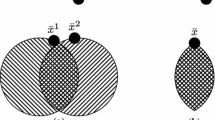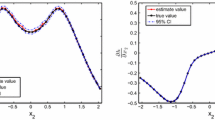Abstract
We investigate an empirical quantile estimation approach to solve chance-constrained nonlinear optimization problems. Our approach is based on the reformulation of the chance constraint as an equivalent quantile constraint to provide stronger signals on the gradient. In this approach, the value of the quantile function is estimated empirically from samples drawn from the random parameters, and the gradient of the quantile function is estimated via a finite-difference approximation on top of the quantile-function-value estimation. We establish a convergence theory of this approach within the framework of an augmented Lagrangian method for solving general nonlinear constrained optimization problems. The foundation of the convergence analysis is a concentration property of the empirical quantile process, and the analysis is divided based on whether or not the quantile function is differentiable. In contrast to the sampling-and-smoothing approach used in the literature, the method developed in this paper does not involve any smoothing function and hence the quantile-function gradient approximation is easier to implement and there are less accuracy-control parameters to tune. We demonstrate the effectiveness of this approach and compare it with a smoothing method for the quantile-gradient estimation. Numerical investigation shows that the two approaches are competitive for certain problem instances.
Similar content being viewed by others
References
van Ackooij, W., Henrion, R.: Gradient formulae for nonlinear probabilistic constraints with Gaussian and Gaussian-like distributions. SIAM J. Optim. 24(4), 1864–1889 (2014). https://doi.org/10.1137/130922689
Birgin, E.G., Castillo, R.A., Martínez, J.M.: Numerical comparison of augmented Lagrangian algorithms for nonconvex programs. Comput. Optim. Appl. 31, 31–55 (2012). https://doi.org/10.1007/s10589-005-1066-7
Birgin, E.G., Fernández, D., Martínez, J.M.: The boundedness of penalty parameters in an augmented Lagrangian method with constrained subproblems. Optim. Methods Softw. 27(6), 1001–1024 (2012). https://doi.org/10.1080/10556788.2011.556634
Birgin, E.G., Martínez, J.M.: Practical augmented Lagrangian methods for constrained optimization. Soc. Ind. Appl. Math. (2014). https://doi.org/10.1137/1.9781611973365
Calafiore, G., Campi, M.C.: Uncertain convex programs: randomized solutions and confidence levels. Math. Prog. 102, 25–46 (2005). https://doi.org/10.1007/s10107-003-0499-y
Calafiore, G., Campi, M.C.: The scenario approach to robust control desgin. IEEE Trans. Autom. Control 51, 742–753 (2006). https://doi.org/10.1109/TAC.2006.875041
Campi, M.C., Garatti, S.: A sampling-and-discarding approach to chance-constrained optimization: feasibility and optimality. J. Optim. Theory Appl. 148, 257–280 (2011). https://doi.org/10.1007/s10957-010-9754-6
Cao, Y., Zavala, V.M.: A sigmoidal approximation for chance-constrained nonlinear programs. Technical Report, arXiv:2004.02402 (2020). https://doi.org/10.48550/arXiv.2004.02402
Charnes, A., Cooper, W.W., Symonds, G.H.: Cost horizons and certainty equivalents: an approach to stochastic programming of heating oil. Manag. Sci. 4(3), 235–263 (1958). https://doi.org/10.1287/mnsc.4.3.235
Csörgő, M., Révész, P.: Strong approximation of the quantile process. Ann. Stat. 6(4), 882–894 (1978). https://doi.org/10.1214/aos/1176344261
Curtis, F.E., Wächter, A., Zavala, V.M.: A sequential algorithm for solving nonlinear optimization problems with chance constraints. SIAM J. Optim. 28(1), 930–958 (2018). https://doi.org/10.1137/19M1261985
Davis, D., Drusvyatskiy, D.: Stochastic subgradient method converges at the rate \(O(k^{-1/4})\) on weakly convex functions. Technical Report, arXiv:1802.02988 (2018). https://doi.org/10.48550/arXiv.1802.02988
Durrett, R.: Probability: Theory and Examples. Cambridge University Press, Cambridge (2019). https://doi.org/10.1017/9781108591034
Garnier, J., Omrane, A., Rouchdy, Y.: Asymptotic formulas for the derivatives of probability functions and their Monte Carlo estimations. Eur. J. Oper. Res. 198(3), 848–858 (2009). https://doi.org/10.1016/j.ejor.2008.09.026
Geletu, A., Hoffmann, A., Klöppel, M., Li, P.: An inner-outer approximation approach to chance constrained optimization. SIAM J. Optim. 27(3), 1834–1857 (2017). https://doi.org/10.1137/19M1261985
Henrion, R., Möller, A.: A gradient formula for linear chance constraints under Gaussian distribution. Math. Oper. Res. 37(3), 475–488 (2012). https://doi.org/10.1287/moor.1120.0544
Hong, L.J.: Estimating quantile sensitivities. Oper. Res. 57(1), 118–130 (2009). https://doi.org/10.1287/opre.1080.0531
Hu, J., Peng, Y., Zhang, G., Zhang, Q.: A stochastic approximation method for simulation-based quantile optimization. INFORMS J. Comput. (2022). https://doi.org/10.1287/ijoc.2022.1214
Jiang, R., Guan, Y.: Data-driven chance constrained stochastic program. Math. Program. 158, 291–327 (2016). https://doi.org/10.1007/s10107-015-0929-7
Kannan, R., Luedtke, J.R.: A stochastic approximation method for approximating the efficient frontier of chance-constrained nonlinear programs. Math. Program. Comput. 13, 705–751 (2021). https://doi.org/10.1007/s12532-020-00199-y
Kibzun, A.I., Uryas’ev, S.: Differentiation of probability functions: the transformation method. Comput. Math. Appl. 30(3), 361–382 (1995). https://doi.org/10.1016/0898-1221(95)00113-1
Kibzun, A.I., Uryas’ev, S.: Differentiability of probability function. Stoch. Anal. Appl. 16(6), 1101–1128 (1998). https://doi.org/10.1080/07362999808809581
Küçükyavuz, S.: On mixing sets arising in chance-constrained programming. Math. Program. 132, 31–56 (2012). https://doi.org/10.1007/s10107-010-0385-3
Larson, J., Billups, S.C.: Stochastic derivative-free optimization using a trust region framework. Comput. Optim. Appl. 64(3), 619–645 (2016). https://doi.org/10.1007/s10589-016-9827-z
Liu, J., Lisser, A., Chen, Z.: Distributionally robust chance constrained geometric optimization. Math. Oper. Res. (2022). https://doi.org/10.1287/moor.2021.1233
Liu, X., Küçükyavuz, S., Luedtke, J.: Decomposition algorithms for two-stage chance-constrained programs. Math. Program. 157, 219–243 (2016). https://doi.org/10.1007/s10107-014-0832-7
Lodi, A., Malaguti, E., Nannicini, G., Thomopulos, D.: Nonlinear chance-constrained problems with applications to hydro scheduling. Math. Program. 191, 405–444 (2022). https://doi.org/10.1007/s10107-019-01447-3
Loève, M.: On almost sure convergence. Berkeley Symposium on Mathematical Statistics and Probability 2, 279–303 (1951). https://projecteuclid.org/ebook/Download?urlid=bsmsp/1200500235&isFullBook=false
Luedtke, J.: A branch-and-cut decomposition algorithm for solving chance-constrained mathematical programs with finite support. Math. Program. 146, 219–244 (2014). https://doi.org/10.1007/s10107-013-0684-6
Luedtke, J., Ahmed, S.: A sample approximation approach for optimization with probabilistic constraints. SIAM J. Optim. 19(2), 674–699 (2008). https://doi.org/10.1137/070702928
Luedtke, J., Ahmed, S., Nemhauser, G.L.: An integer programming approach for linear programs with probabilistic constraints. Math. Program. 122, 247–272 (2010). https://doi.org/10.1007/s10107-008-0247-4
Luo, F., Larson, J.: Quantile optimization software (2023). https://doi.org/10.5281/zenodo.10044073
Mangasarian, O., Fromovitz, S.: The Fritz John necessary optimality conditions in the presence of equality and inequality constraints. J. Math. Anal. Appl. 17(1), 37–47 (1967). https://doi.org/10.1016/0022-247X(67)90163-1
Nemirovski, A., Shapiro, A.: Scenario approximation of chance constraints. In: Calafiore, G., Dabbene, F. (eds.) Probab. Random. Methods Des. Under Uncertainty, pp. 3–48. Springer, London (2005). https://doi.org/10.1007/1-84628-095-8_1
Peña-Ordieres, A., Luedtke, J.R., Wächter, A.: Solving chance-constrained problems via a smooth sample-based nonlinear approximation. SIAM J. Optim. 30(3), 2221–2250 (2020). https://doi.org/10.1137/19M1261985
Peng, Y., Fu, M.C., Heidergott, B., Lam, H.: Maximum likelihood estimation by Monte Carlo simulation: toward data-driven stochastic modeling. Oper. Res. 68(6), 1896–1912 (2020). https://doi.org/10.1287/opre.2019.1978
Pflug, G.C., Weisshaupt, H.: Probability gradient estimation by set-valued calculus and applications in network design. SIAM J. Optim. 15(3), 898–914 (2005). https://doi.org/10.1137/S1052623403431639
Prékopa, A.: On probabilistic constrained programming. In: Proceedings of the Princeton Symposium on Mathematical Programming, pp. 113–138 (1970). https://doi.org/10.1515/9781400869930-009
Qi, L., Wei, Z.: On the constant positive linear independence condition and its application to SQP methods. SIAM J. Optim. 10(4), 963–981 (2000). https://doi.org/10.1137/S1052623497326629
Tong, S., Subramanyam, A., Rao, V.: Optimization under rare chance constraints. SIAM J. Optim. 32(2), 930–958 (2022). https://doi.org/10.1137/20M1382490
Uryas’ev, S.: Derivatives of probability functions and integrals over sets given by inequalities. J. Comput. Appl. Math. 56(1), 197–223 (1994). https://doi.org/10.1016/0377-0427(94)90388-3
Wild, S.M.: Solving derivative-free nonlinear least squares problems with POUNDERS. In: Terlaky, T., Anjos, M.F., Ahmed, S. (eds.) Advances and Trends in Optimization with Engineering Applications, pp. 529–540. SIAM, Philadelphia (2017). https://doi.org/10.1137/1.9781611974683.ch40
Xie, W.: On distributionally robust chance constrained programs with Wasserstein distance. Math. Program. 186, 115–155 (2021). https://doi.org/10.1007/s10107-019-01445-5
Xie, W., Ahmed, S.: On quantile cuts and their closure for chance constrained optimization problems. Math. Program. 172, 621–646 (2018). https://doi.org/10.1007/s10107-017-1190-z
Xu, Y.: Primal-dual stochastic gradient method for convex programs with many functional constraints. SIAM J. Optim. 30(2), 1664–1692 (2020). https://doi.org/10.1137/18M1229869
Acknowledgements
Careful comments from three anonymous referees led to substantial improvements of the main theoretical result and quality of the numerical section. This work was supported by the U.S. Department of Energy, Office of Science, Office of Advanced Scientific Computing Research, Scientific Discovery through Advanced Computing (SciDAC) Program through the FASTMath Institute under Contract No. DE-AC02-06CH11357.
Author information
Authors and Affiliations
Corresponding author
Additional information
Communicated by Luis Zuluaga.
Publisher's Note
Springer Nature remains neutral with regard to jurisdictional claims in published maps and institutional affiliations.
Rights and permissions
Springer Nature or its licensor (e.g. a society or other partner) holds exclusive rights to this article under a publishing agreement with the author(s) or other rightsholder(s); author self-archiving of the accepted manuscript version of this article is solely governed by the terms of such publishing agreement and applicable law.
About this article
Cite this article
Luo, F., Larson, J. An Empirical Quantile Estimation Approach for Chance-Constrained Nonlinear Optimization Problems. J Optim Theory Appl 203, 767–809 (2024). https://doi.org/10.1007/s10957-024-02532-0
Received:
Accepted:
Published:
Issue Date:
DOI: https://doi.org/10.1007/s10957-024-02532-0
Keywords
- Chance constraints
- Quantile constraints
- Empirical quantile process
- Finite-difference approximation
- Probabilistic augmented Lagrangian method





